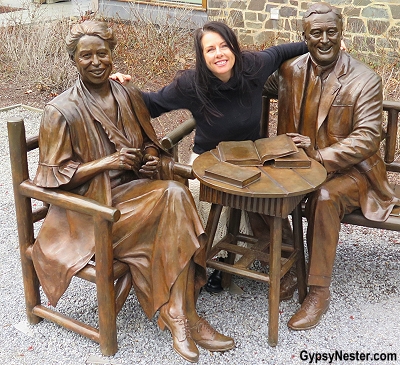
Sometimes in our travels we come upon connections across history — and miles — in coincidental and unpredictable ways.
On our recent exploration through Holland we encountered two important sites in the life of explorer Henry Hudson, the spot where he set sail from Amsterdam in the Half Moon and, Hoorn, where a replica of the ship is headed this summer.
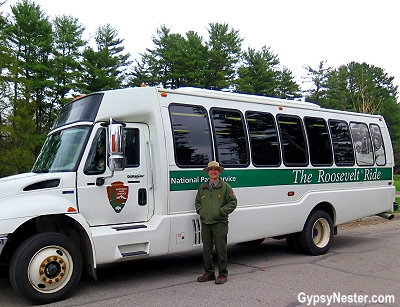
Upon returning to the States we found ourselves once again in old Henry’s stomping grounds.
This time on the banks of the river that bears his name, as we were invited to take the Roosevelt Ride for a visit to the home and library of President Franklin D. Roosevelt at Hyde Park on Hudson in New York.
Exploring the Library and Museum
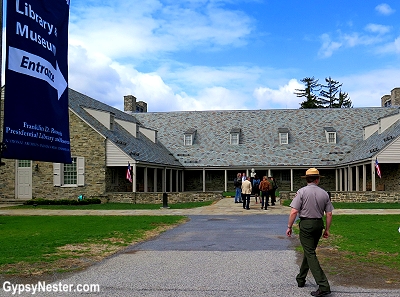
After a hop, skip, and a jump up the Hudson River from New York City on the Metro North train, and a short ride on The Ride from Poughkeepsie, we found ourselves at FDR’s Library & Museum.
Opened in 1940, this was the first US Presidential Library ever created. Before that, presidential papers were considered property of the outgoing executive, so they could do whatever they liked with them.
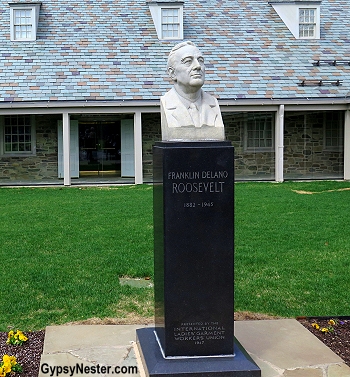
Some even chose to destroy them.
It was Roosevelt’s hope that by donating all of his papers, the library would become an important research center, as well as a preservation of the history of his time in office.
Both aims have been a resounding success.
Thousands of researchers use the archives, and even more visitors, like us, enjoy a firsthand look at one of America’s most influential presidencies.
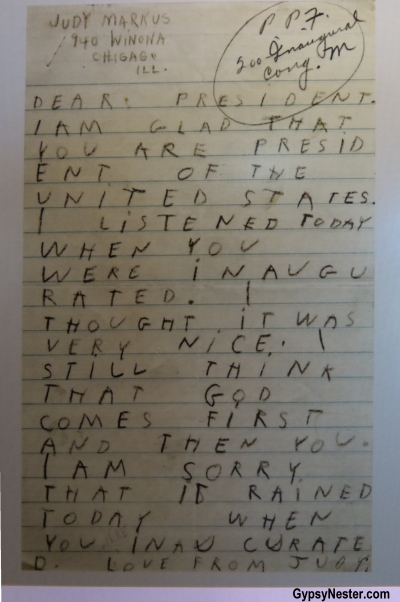
In the entry hall to the museum, a wall is covered with letters sent to the president.
We spent some time perusing the correspondence and found that while most of it was complimentary, several held extremely harsh criticism as well.
Partisan politics is nothing new, but we were impressed that FDR not only kept these, but they are now proudly on display.
Click here to see more examples of our favorite letters sent to FDR.
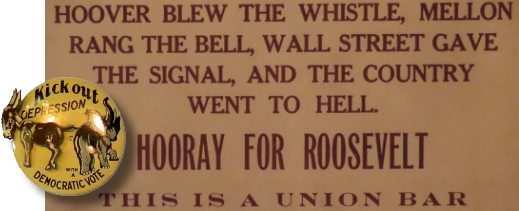
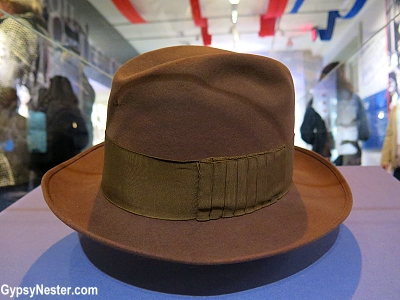
We moved on along a timeline which begins with the Great Depression and FDR’s first campaign, and continues on with mementos from all four of his election victories.
We found a few choice items such as his lucky hat, which he wore in every campaign, and a giant paper mâché sphinx featuring the president’s head.
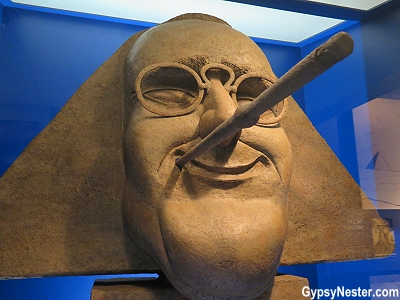
The sphinx head came from the time when speculation was gathering about whether Roosevelt would run for an unprecedented third term.
For a long time the president remained stoically silent on the issue and the press started showing him as a sphinx in political cartoons.
The giant figure was the centerpiece at the annual Gridiron Club White House Correspondent’s Dinner in December of 1939. FDR liked it so much that he asked if he could keep it.
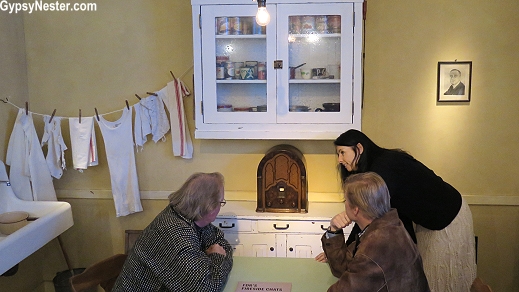
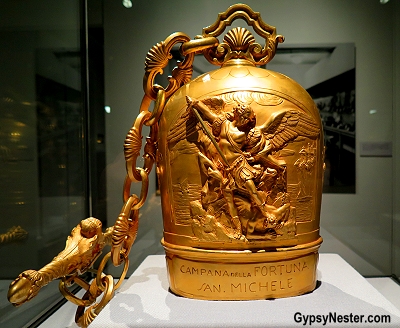
A new temporary exhibit, running only until the end of 2015, features gifts Roosevelt received while in office.
Some fabulous fineries, such as jewel encrusted swords and magnificent china sets, were given by government dignitaries from around the world.
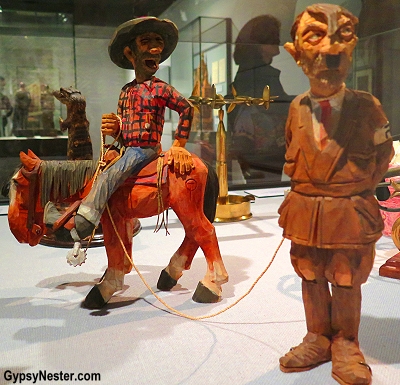
However, much of the more interesting items came from ordinary American citizens.
People sent the president all sorts of hand-made crafts, including a vest made of buttons, an amazing carved wooden bell tower, and figures of a cowboy lassoing Hitler.
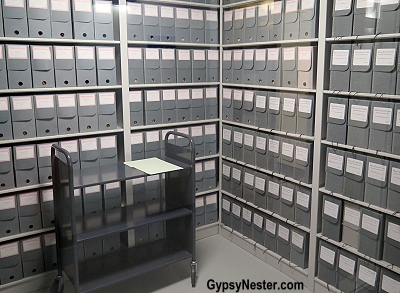
The basement serves as storage space, but cutaway windows were installed so visitors can still take a look at the rooms filled with letters, documents, and a massive collection of model ships.
Roosevelt had been a collector since childhood, mostly of stamps and naval memorabilia.
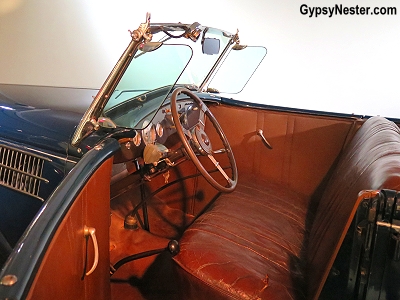
Two of the museum’s most popular exhibits are also down in the cellar, the 1936 Ford Phaeton that FDR had specially modified so that he could drive it only using his hands, and the desk he used in the Oval Office during his presidency.
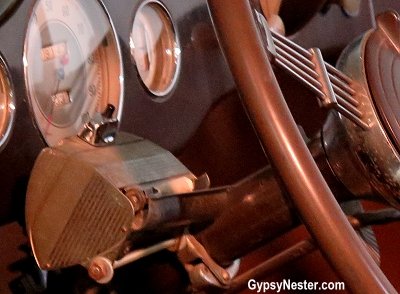
Polio left Roosevelt without use of his legs after contracting the disease at 39 years old in 1921, so a series of knobs and levers were devised to control the brakes, accelerator, and clutch of his car.
A box attached to the steering column delivered a lit cigarette at the touch of a button.
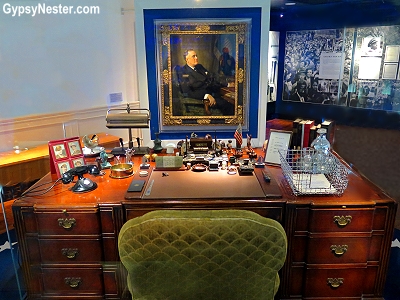
The desk is known as the Hoover desk because it was given to FDR’s predecessor.
When Roosevelt took office in the depths of The Depression, he decided not to change any furniture.
He used this desk his entire time in the White House and the library has kept it just as he left it, with all of the knickknacks and books in place.
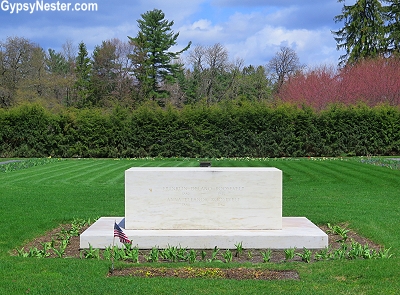
Leaving the museum we passed through a rose garden that was one of the president’s favorite spots on the property.
It is where he chose to be laid to rest, along with Eleanor.
FDR insisted that no large monument be erected, just a plain piece of marble no larger than his desk.
Springwood, where FDR was born, grew up, and used as the Summer White House
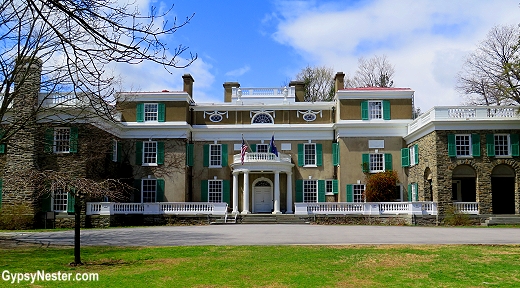
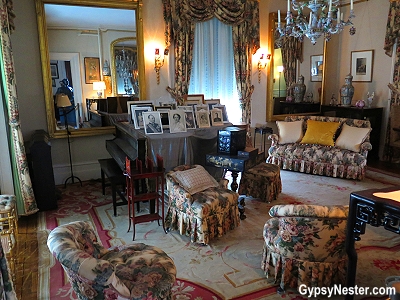
After building the library, he also chose to donate his home and the grounds to the people of the United States effective upon his death.
One year to the day after FDR passed away the home was opened to the public and the entire complex is administrated by the National Park system as a National Historic Site.
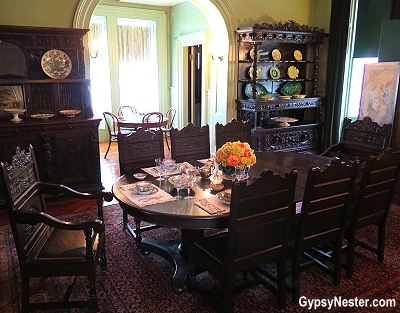
We were met on the driveway of the house by a ranger, Scott, who began by showing us how much the structure was changed from its original floorplan.
The estate, known as Springwood, was purchased by James Roosevelt, the president’s father, in 1866 for forty thousand dollars, which was a healthy chunk of change in those days.
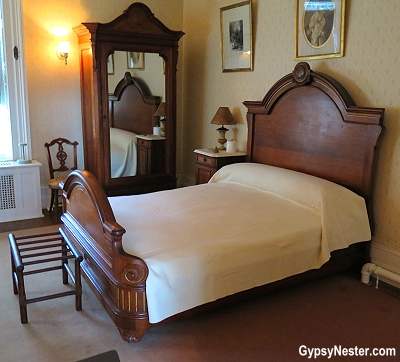
At the time it was a wood-framed house, but after his father’s death FDR’s political ambitions grew, and he thought that the house should too.
By 1916 he had more than doubled the size and completely enclosed the original building inside a new stone edifice he designed to be fitting for a governor of New York, or even to serve as the Summer White House for a president.
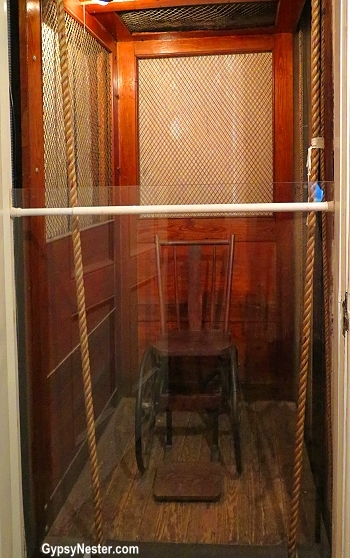
Even as both of those plans came to fruition, the interior remained fairly similar to its original.
There are no huge ballrooms or opulent entryways; in fact the inside is quite homey.
Scott showed us around the ground floor, where more of Roosevelt’s collections are kept.
In the front room, a showcase full of stuffed birds native to the Hudson Valley occupies one wall.
As a youngster the future president collected the specimens, and even performed the taxidermy on a few, until his very protective mother noticed the chemicals were turning his skin green.
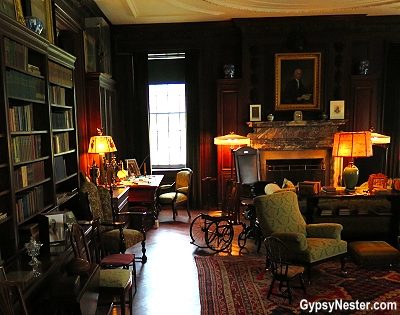
In the study, the desk where FDR worked on his much less toxic stamp collection remains in one corner underneath a large bookshelf.
This room was one of the few in the house that he could call his own.
The home was rightfully his mother, Sara’s, and she continued to live in it until her death in 1941.
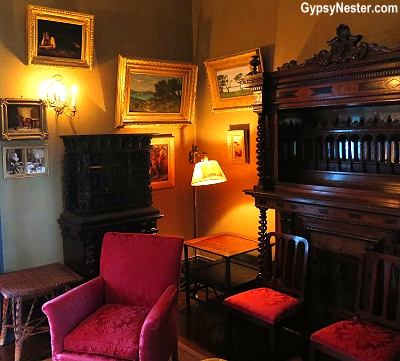
Her little office where she handled the household affairs, was known as the Snuggery because of its cramped quarters, was created by dividing the parlor during remodeling.
We were fascinated by the 1939 RCA television tucked away in a corner, a gift to the president, but can’t imagine that there was any signal to pick up out here in the relative wilderness.
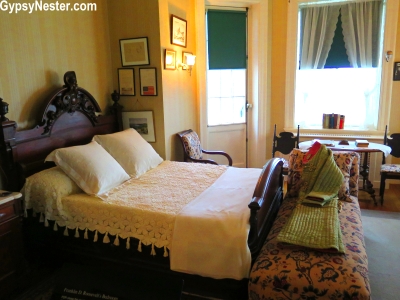
Of course this was also home for Eleanor Roosevelt, but there is ample evidence that she never really felt at home.
Mother-in-law Sara seemed to make certain that it was clear who served as the lady of the house.
There is only one room in the entire house that the First Lady had any impact on, a tiny former dressing room adjacent to the President’s bedroom.
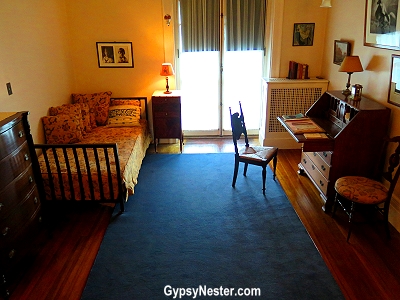
Mrs. Roosevelt, Eleanor, not Sara, turned that little space into her own bedroom after Franklin contracted polio, so she could be nearby to help him.
After finding a packet of amorous letters from her former social secretary, Lucy Mercer, while unpacking FDR’s luggage, Eleanor began spending more and more of her time at Val-Kill Cottage. According to the Library the Roosevelts, “thereafter were more politicall partners than husband and wife.”
Eleanor’s digs, Val-Kill Cottage
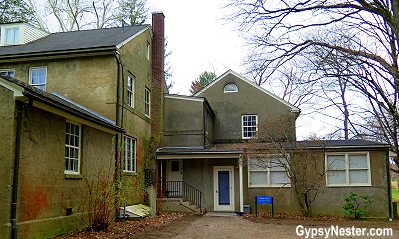
Val-Kill cottage is about two miles away from Springwood and part of the estate, but did not become the Eleanor Roosevelt National Historic Site until 1977.
Mrs. Roosevelt stayed in the home from the time of the president’s death until she passed away in 1962. Then it was sold to developers, and finally a public campaign succeeded in preserving it.
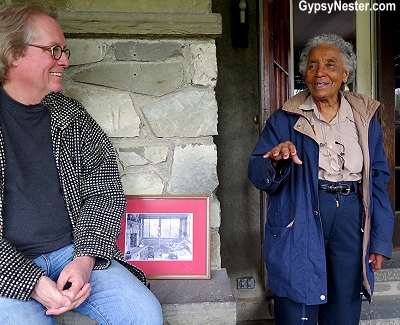
Our guide for Val-Kill was a rare treat indeed, a friend of the First Lady.
Ms. Doris Mack first met Mrs. Roosevelt at an NAACP meeting, and both women were members of the nearby St. James Church.
Doris took us inside and explained that the building was originally used as Val-Kill Industries, a furniture factory that Eleanor Roosevelt established in 1927 with three friends, Nancy Cook, Marion Dickerman, and Caroline O’Day.
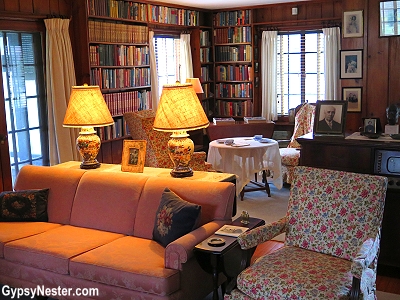
Most of Val-Kill’s present furnishings were made in that factory and used by Mrs. Roosevelt when this became her residence.
The cottage is small, but packed with history, as the former first lady was very active in politics throughout her life.
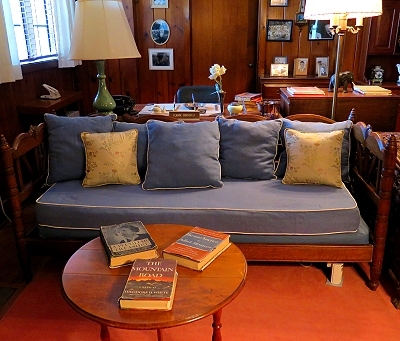
Ms. Mack pointed out the chairs used when a young senator named Kennedy came to Val-Kill in hopes of getting Mrs. Roosevelt’s support as he ran for president in 1960.
The cottage was also a place for outdoor activities, with picnics and swimming being favorites. The President would regularly use the swimming pool as a favorite form of exercise after he had lost the use of his legs.
Today the pool is closed and covered, but plans are in place to refurbish it since it was an integral part of Val-Kill.
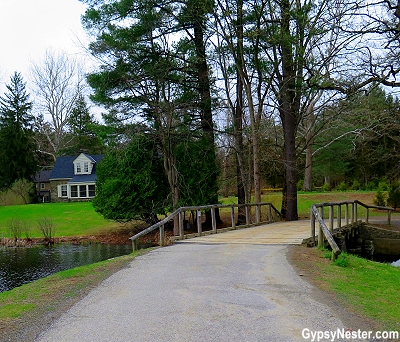
After spending an entire day exploring, we still didn’t come close to seeing everything that we would have liked to.
We most certainly need to make a return trip.
Now we know just a little of how FDR felt when he said, “All that is within me cries out to go back to my home on the Hudson River.”
David and Veronica, GypsyNester.com
DELVE DEEPER:
Find out more about the Roosevelt Ride
Look through more of our favorite letters to FDR from Americans
See the Roosevelt Memorial in Washington, DC
See all of our adventures in New York!
A big thank you to Franklin D. Roosevelt Presidential Library and Museum, Dutchess County Tourism and HistoricHydePark.org for providing this enlightening adventure. As always, all opinions are our own.



Nice article. Really it is informative and useful. Thanks for sharing this blog.
FDR’s library looks like quite the place … thanks for the look inside!
Looks like a wonderful place to visit for anyone interested in learning more about the Roosevelt’s. I love that the gizmo in the car delivered a “lit” cigarette. That must have really been quite an accessory back in the day!
Surprised it didn’t catch on.
Great pace for any Roosevelt fans. 🙂 Great read.
Thanks Laura!
Loved the tour. I have always wanted to go there. I recently read a book -The Boys in the Boat, that featured the summer house in the story. Great Photos!
Thanks Suzanne, have to look for the book.
What an interesting place! I recently visited the Teddy Roosevelt childhood home in NYC, which is also fascinating. They were really an extraordinary family!
They certainly were.
I’d most like to visit Springwood. My father was born and raised in Poughkeepsie, even attended Vassar in the first class with men, after WW II.
Cool link Carole, thanks! Love the picture of Danny Thomas & Elvis.
Thanks for the virtual tour – looking forward to visiting there myself.
Fascinating, I loved the tour and seeing all those amazing homes and the library. Thanks for the tour.
very interesting that FDR was the first President to donate papers to a library. I’d enjoy visiting both Springwood and Val-Kill Cottage.
We thought that was surprising too. So much history had been lost before that.
We visited Hyde Park four years ago and found everything moving since the three of us had been kids during WWII. The best part of the entire visit was being part of the last tour to Val Kill on a splendid autumn day with a ranger and others of us who loved Eleanor Roosevelt. Everyone wanted to recall special memories of Mrs. R. I agree with above comment–much better than FDR home.
It is certainly more personal than Springwood, and we were so lucky to get to meet Doris Mack.
Eleanor Roosevelt was an intriguing and extraordinary woman and one that I admire a lot. I really enjoyed the letter to the President.
We love visiting old presidents’ homes and museums and libraries. I have not been to either of these, but hey there’s always room on my list!
We recently visited Eleanor’s home…what a fascinating couple. Only paled by the Gypsy Nesters:-) Love the photo of you with the sculpture!
Thanks, but we can hardly claim to be in their league. (blush)
Larger than life, yet strangely familiar even though before our time, Roosevelt’s determination and personality are epitomized by the hand-operated elevator and modifications to his car. Have you read Sunrise at Campobello? Pre-Presidential setting with wonderful details. I’d like to visit Hyde Park someday. Thanks.
Haven’t read it, we’ll have to look for it, thanks.
Hyde Park has been on my list to visit for the longest time, but somehow I’ve never made it. Your post makes me want to go there more than ever…I would especially like to see Val-Kill. What a treat to meet someone who knew Eleanor Roosevelt!
It was the same for us, so glad we finally did visit. It is really easy from NYC on the Metro North to Poughkeepsie, then the Roosevelt Ride will take you right there and back to the train station.
I’d love to visit this place as I’m a huge fan of of Franklin and especially, Eleanor Roosevelt. Both were extraordinary people with humanitarian views far ahead of their times. I’m currently reading the book, “Hissing Cousins” about the relationship between Eleanor Roosevelt and her first cousin, Alice Roosevelt Longworth. It provides some fun insights into the lives of these fascinating people.
They most certainly were. Thanks for the heads up on the book. We’ll have to check it out.
We lived 10 minutes from there for years. Love Valkill way more than the stuffy FDR home. Did you get to Rhinebeck? I had a boutique there.
We visited Rhinebeck last fall for the sheep and wool festival. Loved it!